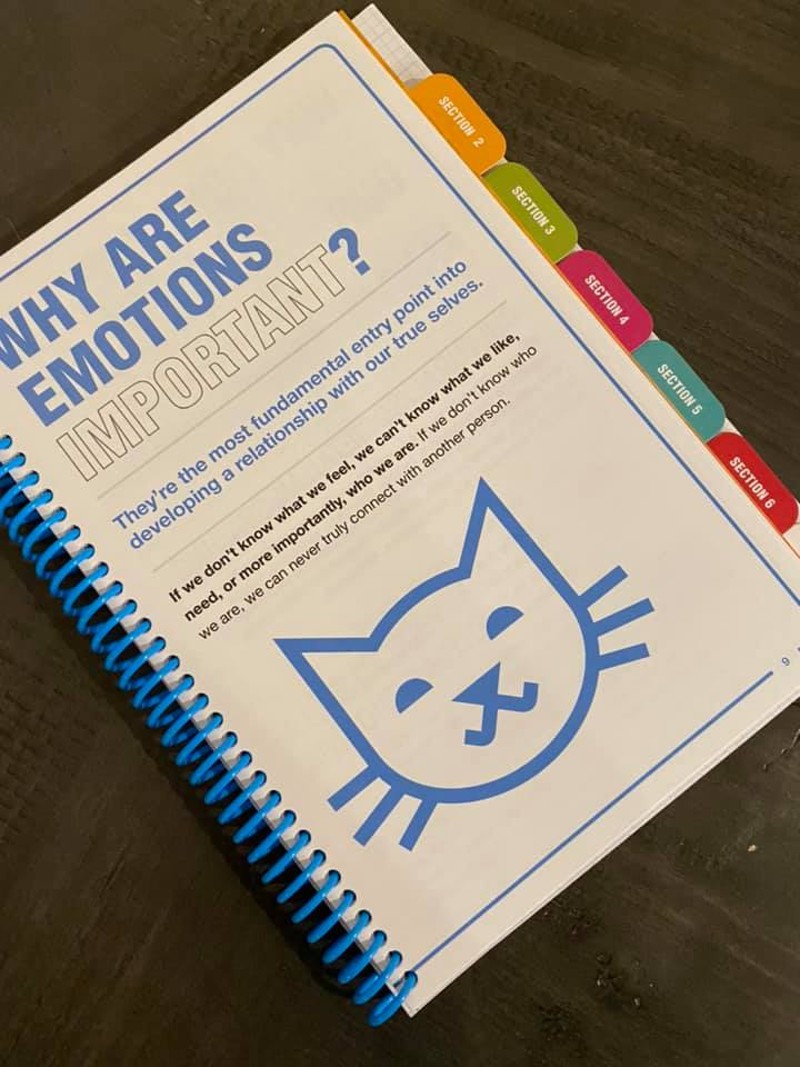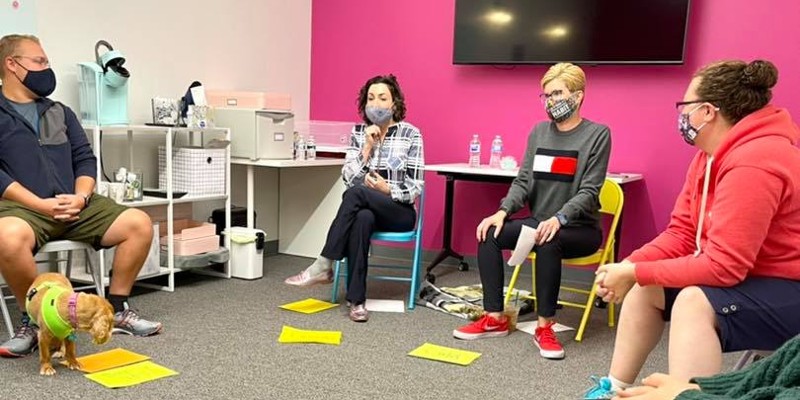I had the chance to chat with the Lindsay Haitz and Gina Johnson, leaders of Blueprint, a local therapy service in Champaign-Urbana. They have been able to create a successful business focused on helping and healing people. They have impressive backgrounds, both publishing books surrounding various mental health issues.
We spoke about the services they provide, and how integral therapy is to our community as a whole. As therapy and mental health are often stigmatized, Blueprint’s services provide a safe space for those to improve themselves.
Smile Politely: Hello! Can you introduce yourself and your background in therapy?
Lindsay Haitz: My name is Lindsay Haitz. I am a licensed professional counselor. My partner, Gina is a licensed clinical social worker, so we have a little bit of a different background since she’s in social work and I’m in counseling. I’m a certified life coach too, and I also manage a lot of the administration stuff at Blueprint. I see clients and I do a hybrid model of counseling and coaching. What that means is that counseling is very past-focused on healing and coaching is future-focused on growth. My style is typically to be more coaching focused, and as you go down that path, things that need healing are brought up.
SP: How did Blueprint get started?
Gina Johnson: Blueprint started in 2009 with the idea of starting an independent mental health practice, but always with the vision of including a lot of different entry points to treating mental health. From my own experience going through many mental health systems, I realized how a lot of systems are broken. I saw how much everyone wanted to label me as a diagnosis instead of a person. That first-hand experience really motivated me to start trying to make a change in mental healthcare. I’m really passionate about sharing my personal stories. If we’re helping other people, we should know what it’s like.
SP: What kind of services are offered by Blueprint?
Haitz: In addition to seeing clients, we also do a lot of classes and groups. We do a six-week class where people can learn psychological skills. Maybe you don’t need therapy right now or have done therapy and want to move on to something different, so we can do different classes depending on what you need.
We also do applied improv classes. It’s kind of like improv for mindfulness or improv to deal with stress. That way you can learn some skills and apply them in practice. For example, if you get nervous while talking in front of people, you can work on self-regulating your nervous system and practice working on your breathing by doing an improv scene totally unrelated to what’s going on. For instance, you could improv being a drive-thru worker where a customer gets upset with their order. Then, you would practice listening skills, breathing, and more. Having fun is key here.
We do one-on-one therapy, group classes, and even retreats — like a 2-day retreat we’re doing at Allerton in April.

Photo from Blueprint Facebook page.
SP: You and Gina have created a Blueprint workbook together. Can you talk about the process of creating the book and its impact on Blueprint?
Haitz: We wanted to make something that people could use if they didn’t want to come to therapy or live far away. We created it with all our favorite tips, tools, and research, and tried to make it very practical so that people can learn things about themselves and how to be themselves. Our main motto is, “Know yourself, accept yourself, be yourself.” We really want people to live a life that they’re happy with. When things get stressful, how do you be yourself? So, our workbook is really the “how” of tackling these questions.
We talk about emotions — why do we have emotions, what are they for, and what do they mean? We discuss self-talk, which is the messaging that’s running through your head and how to work with that. There’s a big self-discovery piece too. People can come up with their “Blueprint motto” which basically describes what they’re about in the same way that companies have tag lines. These phrases can help guide us.
SP: You say you want to “socialize mental health.” Can you explain to readers what you mean by that, and the positives of it?
Haitz: Our work is based on evidence-based practices. We know what works from science. Socializing mental health is destigmatizing it and making it accessible and approachable. Many people feel like non-visible disabilities (like anxiety, depression, bipolar disorder, PTSD, ADHD, etc.) are weaknesses. What we want to do is gather people to do activities and promote their growth. For that reason, we have a lot of options for people, so people can feel like they can choose what fits them best. Do you want meditation and yoga classes, sound healing, or something else? We have many opportunities for you.
We try to look at the person from all angles and really tackle therapy from a holistic perspective. By doing this, we take away the stigma. People with depression and anxiety can have functioning and successful lives. Therapy really helps everyone. Even learning simple communication strategies with your partner, kids or colleagues can significantly improve your life.
SP: What is your ultimate goal for those you provide therapy for?
Haitz: It really depends what their goals are. My goal is to be a support system and coach to help them build their awareness. It really comes back to them knowing themselves, accepting themselves, being themselves. My goal is to help them figure out who they are. There’s pieces of ourselves that we don’t necessarily like or love, but we want to accept that that’s the reality. We also need to understand how that looks in practice, in day-to-day life. It’s really a holistic look into integrating all these different parts as a person: like relationships, career, spirituality, etc. It’s important to align thoughts, words, and actions.
SP: Gina has written a book called Let’s Make it A Habit: Train Your Brain to Navigate Negativity. Can you talk about the main themes of the book and the impressive process of creating a book?
Johnson: That book basically details how we’re inherently more drawn to negative things than positive or neutral things, 3-5 more times drawn to it. That’s based on our survival brain and nervous system. Learning how to work with that is extremely important since you can’t get away from it. It’s a really practical book to help anyone understand themselves when they get stuck in negativity. My goal was for it to be a very simple book and open anywhere and get some useful information that they could start using right away. It’s a book that’s all based on evidence-based practices. I did a lot of secondary research for that book. I tried to break down a lot of neuroscience into really simple micro-practice things that people could incorporate into their daily lives.
SP: What do you think are the biggest barriers in mental healthcare right now?
Haitz: I would say stigma seems to be the main issue. Or lack of awareness or education. They kind of feed into each other. Also, people not understanding what therapy is about or who it is for. Also, there’s the old paradigm that therapy is only needed in a time of crisis instead of taking care of yourself throughout your lifetime.
Johnson: Finances are also a barrier for sure. Unfortunately, therapy is expensive, but we try to give away classes when we can.
SP: How can C-U readers learn more about your therapy opportunities?
Haitz: Follow us on Facebook and Instagram! We’re going to post many resources, including events that are free, in-person, virtual, and more. We offer telehealth but also do a lot of hybrid things. We’re really trying to make it accessible and inclusive, so anyone can start on the website, social media, or just e-mail me! We can discuss price points, services, or anything.
Blueprint
2704 Boulder Drive, Suite B
Urbana








